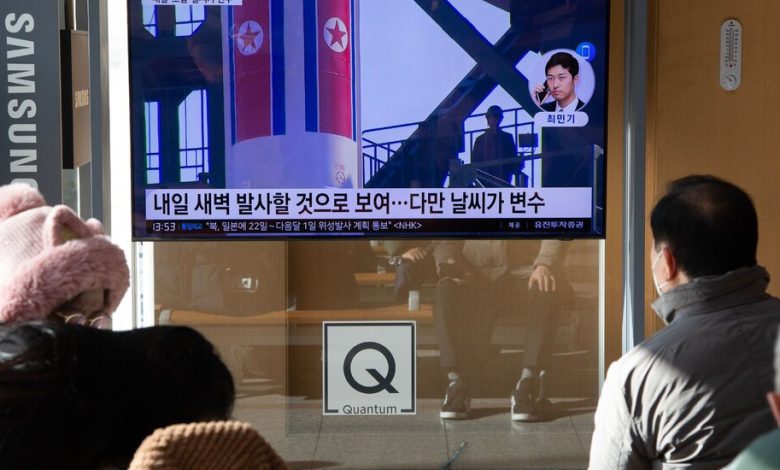North Korea Launches Rocket With Its First Spy Satellite

SEOUL — North Korea launched a rocket on Tuesday in what South Korea said was an attempt to put its first military reconnaissance satellite in orbit, this time with technological help from Russia.
The rocket flew to the south over the sea between the Korean Peninsula and China, the South Korean military said in a brief statement. The United States, South Korea and Japan have all placed their militaries on alert to guard against such a launch, concerned that debris from the North’s rocket might fall on the Asian allies’ territories. They also want to collect intelligence on the rocket to determine the implications its satellite program may have on regional stability.
North Korea launched its new Chollima-1 rocket from its satellite launching station in Tongchang-ri near its northwestern border with China in May and again in August. The rocket flew on the same southbound trajectory, seeking to place satellites in orbit so that North Korea could better monitor American and South Korean military movements in the region and improve its nuclear-attack capabilities. But both times, the rockets malfunctioned and failed to thrust the Malligyong-1, the North’s first homemade military spy satellite, into orbit.
This week, North Korea told the International Maritime Organization that it would soon make a third attempt. And this time, North Korea received assistance from Russia, helping the North overcome its technological shortcomings, according to South Korean officials who have monitored its launch preparations in Tongchang-ri in recent weeks.
Moscow’s help with Pyongyang’s troubled satellite program was part of a package of incentives North Korea had been expected to receive from Russia in return for the North’s providing artillery shells and other badly needed munitions to help Russia’s war in Ukraine, the South Korean officials said.
The North’s launching on Tuesday defied multiple warnings from the United States, South Korea and Japan against such launches. Under United Nations Security Council resolutions Moscow had agreed to, North Korea is banned from launching space rockets because it had used them in the past to develop its long-range ballistic missile capabilities. The resolutions also prohibit countries from buying weapons from North Korea or transferring technology to help advance the North’s nuclear and rocket capabilities.
But the war in Ukraine is bringing Moscow and Pyongyang closer together, as the old Cold War-era allies have a shared interest in confronting their common enemy, the United States.
North Korea’s leader, Kim Jong-un, has what his Russian counterpart, Vladimir V. Putin, desperately needs: artillery shells, rockets and other conventional munitions that can help replenish Mr. Putin’s depleted stores of weapons as his invasion of Ukraine becomes a drawn-out war of attrition.
In return, Mr. Kim hopes to get food and fuel from Russia to help alleviate his country’s chronic shortages, as well as spare parts to upgrade its aging Soviet-era tanks and warplanes. North Korea also seeks technical know-how from Russia to advance its nuclear and rocket programs, which otherwise would not have been available under international sanctions, according to officials and analysts.
Moscow and Pyongyang have denied they are engaging in such transactions. But when Mr. Kim and Mr. Putin met in the Russian Far East in September, they agreed to broaden bilateral cooperation.
They disclosed few details about the meeting, but Mr. Kim indicated what he wanted by visiting a space launch center, a fighter jet manufacturing factory and a naval base during his trip in the Far East.
